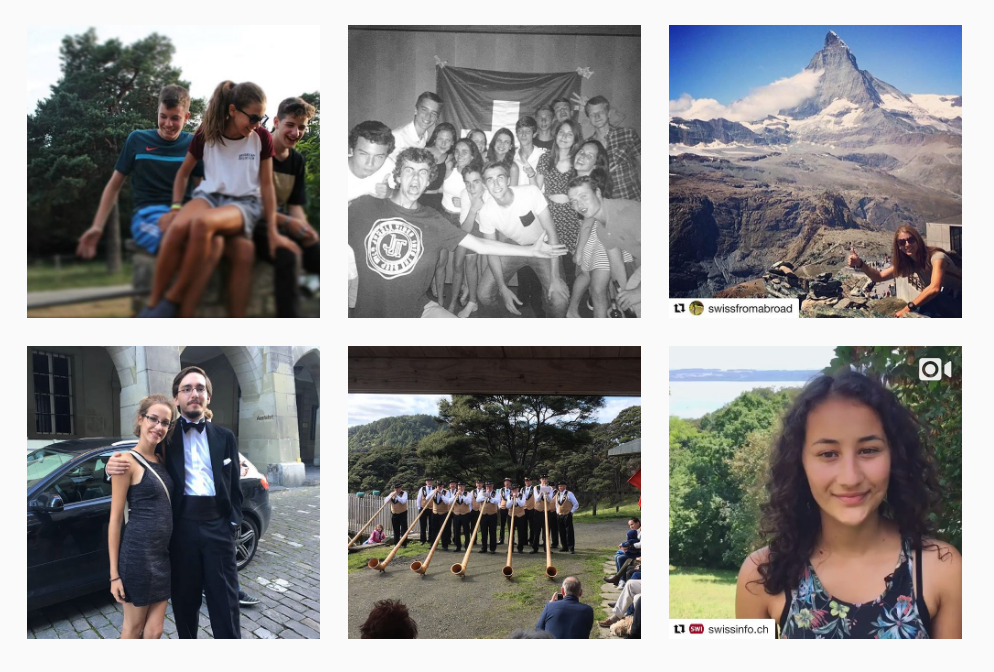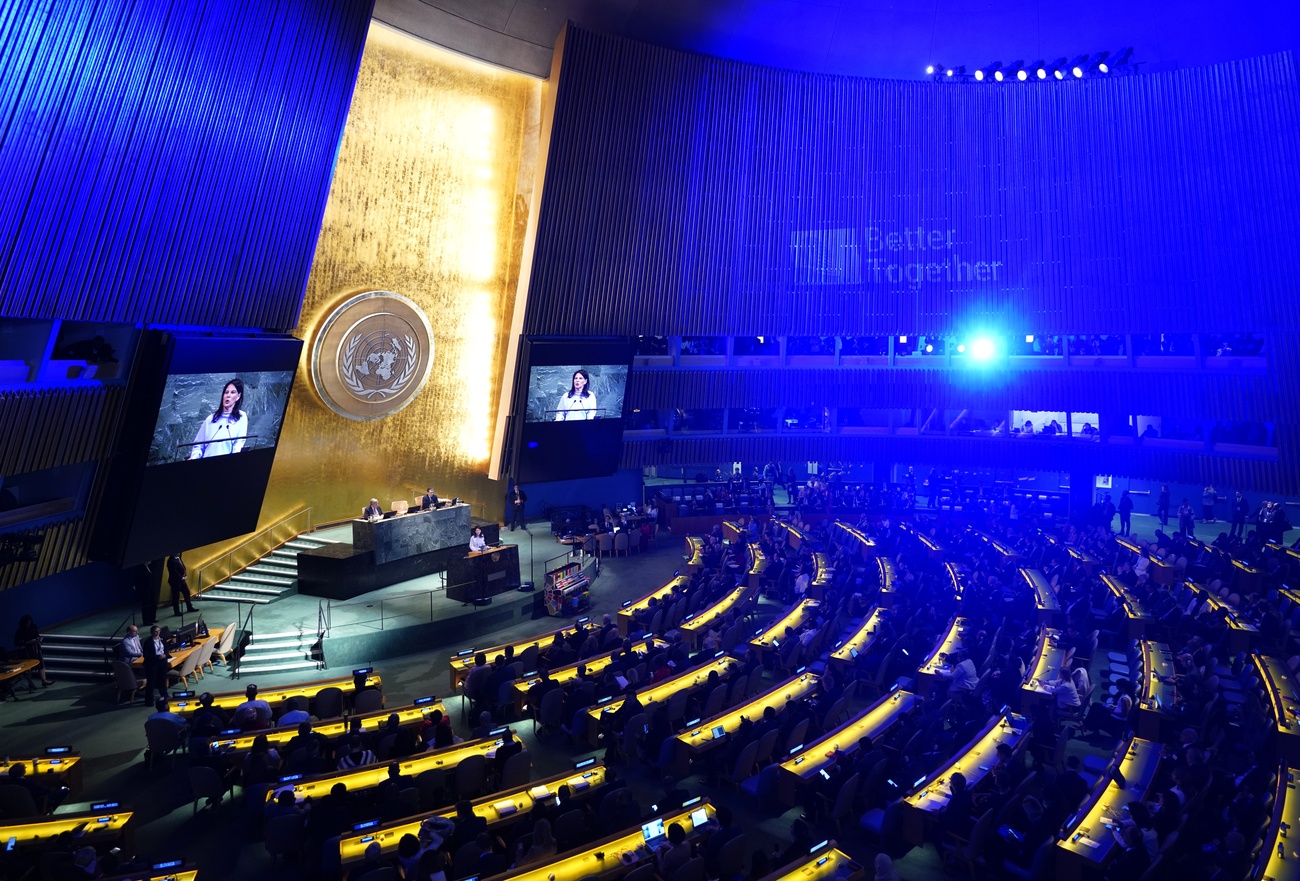
Selina Thomas: Menu juggling in the Philippines
Fantastic weather, nice people and crazy traffic. 33-year-old Selina Thomas loves living in the Philippines, despite finding it tough to plan the next meal.
SWI swissinfo.ch: What made you leave Switzerland?
Selina Thomas: My husband’s employer asked him to relocate to the Philippines and we jointly decided to take the plunge and move. We’d already spent two years in Dubai a while ago so it wasn’t the first time we had to live abroad. We’ve been in Manila since the start of August 2016.
SWI swissinfo.ch: How did you find the first few months of life abroad?
S.T.: The initial few months were exciting. Discovering a new country and a new culture is a bit like being on holiday. We have our own pool here and the weather is generally good. Of course, we also suffered from culture shock. For example, going shopping here isn’t exactly for the faint-hearted. The meat department stinks out the entire shop and instead of chicken breasts, you can only buy chicken feet. There are no fish fillets, only whole fish. Tomatoes, if you’re lucky enough to find them, are always green and broccoli costs a small fortune. All in all, it’s difficult to find fresh, healthy food. The heat also took some getting used to, as the hot, humid weather is exhausting!

More
Dear Swiss living abroad…
SWI swissinfo.ch: Have you left Switzerland for good or are you planning to return one day?
S.T.: Nothing’s been decided yet. I’m sure we won’t stay here forever though. Since my husband, Paul, is Australian, there’s a good chance that we could head to Australia next, or back to Switzerland, or somewhere else.
SWI swissinfo.ch: What kind of work are you looking for? How did it come about and how is it going?
S.T.: In Switzerland, I worked in human resources for a foreign bank. At the moment, I’m looking for a job but it’s not proving all that easy, as I only have a residence permit and no work permit. Moreover, the locals are well trained and experienced. And, as the saying goes, my competition never sleeps.
To keep myself occupied, I’m currently writing a book about my time in Dubai. I’ve also taken on a few freelance jobs. I offer project support and project management work in the field of change management for small and medium-sized companies which do not have the in-house capacity for such tasks. This is currently going quite well and I’m really enjoying being my own boss.
SWI swissinfo.ch: Where do you live at the moment? What’s the lifestyle and food like?
S.T.: We live in Fort Bonifacio, Manila. The way of life is very different from that in Switzerland. The people are unbelievably friendly, sincere and courteous. The culture is very family-oriented. There’s always a reason to celebrate and the locals set great store by hospitality. Although the people have very little, they share what they do have without any bias. We’re not used to this at all.
Life isn’t easy for most people here, yet the majority have a very optimistic outlook. And this is infectious. You begin to take life a little less seriously and to concentrate on what truly matters in life. People are extremely patient and resilient.
Unfortunately, the cuisine doesn’t stand out as much as it does in countries like Thailand or Japan. The food is sweet, sour and salty and very high in fat. It mainly consists of meat and rice, and the people love ready meals and fast food.
I try to cook healthy meals at home as much as possible but this isn’t always easy, as fresh food is expensive and hard to come by in supermarkets. Just because a shop stocks cucumbers one day doesn’t mean that it will have any the next. That makes it difficult to plan and I always find myself having to put together a menu for the evening meal only when I am actually in the supermarket. You just have to be flexible…
Selina with her husband at an Oktoberfest celebration in the Philippines
SWI swissinfo.ch: What aspects of the Philippines are more attractive than Switzerland?
S.T.: The weather and the incredibly friendly people, of course.
SWI swissinfo.ch: What is the biggest difference between the Philippines and Switzerland?
S.T.: The traffic. Apart from the intercity buses and “jeepneys”, public transport is non-existent. There’s congestion everywhere and sometimes it can even take an hour or more to travel just four kilometres. You’d be quicker going by foot but that’s often not possible because turning up to meetings dripping in sweat isn’t exactly ideal.
The country is hugely overpopulated and the infrastructure isn’t able to cope any more, which is why you have to queue for absolutely everything, withdrawing cash, for example. Something else I’m not at all accustomed to is the lack of awareness for the environment. Everyone fills up their cars using the cheapest diesel, everything is packed in at least three plastic bags and people simply throw takeaway coffee cups out of car windows.
In certain parts of Manila, it is necessary to wear a face mask due to air pollution, says Selina
SWI swissinfo.ch: What do you think of Switzerland now that you’re no longer living there?
S.T.: It’s incredible just how well organised Switzerland is. And how clean it is. You can take it for granted that everything is just going to work. Living here makes you appreciate just how important it is to keep infrastructure well maintained and to adapt it as necessary. If you don’t do that, the system is doomed to fail.
Switzerland is an amazing country! Unfortunately, however, most people are under immense pressure to perform, which of course doesn’t make them all that pleasant to live with. There’s a real “me first” mentality.
SWI swissinfo.ch: What is the political situation like in the Philippines, especially since the new president, Rodrigo Duterte, has assumed office? Have you seen any signs of his war on drugs during your day-to-day life?
S.T.: We haven’t picked up on anything where we live. However, everyone knows that they’d better stay well away from drugs.
SWI swissinfo.ch: Do you keep up to date with politics in Philippines?
S.T.: I do my best to stay well informed but it isn’t particularly easy since the freedom of the press is limited here and the western media’s coverage of Duterte isn’t all that objective. I’ve only just come to realise that the western media reports just as much rubbish as in other parts of the world. The stories it makes up about Duterte are simply ridiculous.
I also don’t understand why he’s depicted as a monster and why nobody comments on the positive things, such as his fight against corruption, his support of family planning schemes (contraception was regarded as a sin here until last year) and his endeavours to improve the traffic situation.
I know it’s a thorny issue but he has incredible support from the population here.
SWI swissinfo.ch: Do you vote in Swiss elections and referendums?
S.T.: Yes.
SWI swissinfo.ch: What do you miss the most about Switzerland?
S.T.: The clean air, being able to drink water straight from the tap, healthy food, the public transport system and, of course, my family and friends.
Are you a Swiss citizen living abroad? If so, add the hashtag #WeAreSwissAbroadExternal link to your photos on Instagram.

In compliance with the JTI standards
More: SWI swissinfo.ch certified by the Journalism Trust Initiative




























You can find an overview of ongoing debates with our journalists here . Please join us!
If you want to start a conversation about a topic raised in this article or want to report factual errors, email us at english@swissinfo.ch.